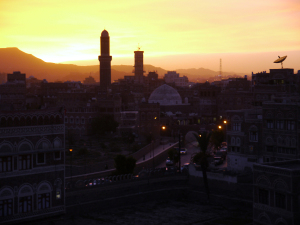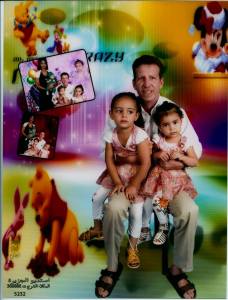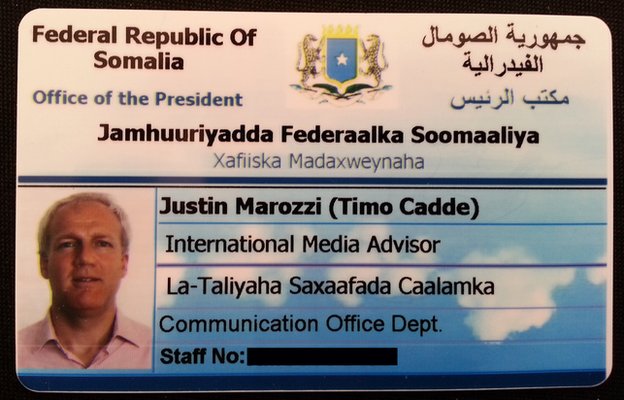I had to evacuate from Yemen in March 2014. I was targeted for assassination by a group most likely affiliated to al Qaeda. The assailants scaled the wall of a neighbors house. The guards there opened fire, killing two of the would be assailants and injuring two more. The others escaped. The two injured assailants admitted under questioning that they were, in fact, after me, Kyle Foster. Thus, I had to evacuate the country that I love. My wife and children and I are now living in Nebraska. We hated to leave Yemen but the adventure of our life continues. My girls are looking forward to the first snowfall.
My Friend Mikael asked if I thought that an old article I wrote 3 years ago is still relevant, given recent events in Yemen. The Huthi Shia rebel movement has taken over the capitol, Sana’a. The Huthis are widely believed to be backed by Iran. My answer to Mikael, after thinking this over for a week, is that Yemen is still isolated and misunderstood and that this is just another page in the colorful history of Yemen. The Persians have ruled in Yemen before and in fact, Yemen has always been a place where competing Middle-East powers and ideologies meet in a proxy tug of war. So long story short, Mikael, let’s not worry too much about Yemen. The strength and resiliency of the people will pull her through. Just yesterday all sides in the conflict have agreed to a cease-fire and have begun to disarm. Yemenis have a long history of conflict mediation and they understand how to ride the balance of power when outside influences seek to disrupt their internal balance of power. And more often than not, the Yemeni people have found a way to use those conflicts to their advantage – this is why they are one of the oldest countries in the world.
My article below:
“I am writing to you from a long, white sands beach under swaying palm trees on the south coast of Arabia, in Yemen. The sun is setting over the Arabian Sea in a blaze of orange and gold. Yemen has been the place I call home for the last ten years.
It might surprise you to think of some of the world’s most pristine and beautiful beaches in Yemen. Yemen has 1900 kilometers (1180 miles) of coastline and less than 1% of that is developed. Contrary to what many people think, Yemen is not a giant sand pit but a mountainous country, incredibly green in the rainy season. So,when Mikael asked if I might write something about Yemen I grabbed paper and pen and headed straight for the beach. It is here, where the blue waters of the Arabian Sea meet the white sandy beaches and rocky headlands of Arabia that the story of Yemen and its people begin.
Yemen has often been described by scholars as an ‘island’ surrounded by the Arabian /Indian Ocean to the south, the Red Sea to the west and the vast sands of the Rub al-Khali – the Great Arabian Desert – to the north. This geographical isolation has kept Yemen apart and misunderstood by the rest of the world since ancient times. And it has also spurred the people of Yemen to look across seas and sands in search of trade and resources. The ancient Greeks called this place, ‘Arabia Felix,’ in the mistaken belief that Yemen, and not India and the far -east, was the source of spices. In fact, Yemen was the center of the spice route from the far-east and its geographical position allowed for the Kingdom of Saba (reported home of the Queen of Sheba) to benefit from the spice trade through taxes collected on the spice caravans traveling through her land.
Yemen’s isolation has, since ancient times, caused her people to look abroad in search for resources and trade riches. The arches over the windows and the doors of buildings in Mukella, the city behind me, bear the unmistakable stamp of the orient, brought back to Yemen by traders who ventured from India to Malaysia over the Indian Ocean. The people of this country also bear the diverse characteristics of populations from the coast of East Africa, the interior of Arabia and all the way to the far-east. This diverse mix has made Yemen a place of a very unique and distinct culture. And this diverse mix of people, culture and their history may also help to explain why the majority of Yemenis are surprisingly tolerant with a love of music, art and dance all their own as well as a tolerance for and interest in foreigners.
Yemen was relatively little known to the outside world until the 1960s when the secretive and feudal ‘Imam’ or king was overthrown for a republican government.
Yemen has remained little known and misunderstood since the revolution. The recent barrage of international media attention Yemen has received is testament to the world’s lack of understanding regarding this country.
The international media is currently in the habit of calling Yemen a ‘hotbed of terrorism,’ ’the ancestral homeland of Osama Bin Laden,’ (So what??? He wasn’t born here and did not grow up here.) and a place of ‘widespread anti-American sentiment.’ Regarding the Bin Laden issue I pose this to readers. I am a citizen of the United States and I was born there. Ireland is my ancestral homeland. If I committed crimes against humanity would the media report anything other than that I was a citizen of the United States?
Yemenis, some of the friendliest and most peaceful people on earth.
Yemen is, in fact, a place of moderate, tolerant Muslims, both Shia and Sunni, and a place where the great majority of the population strive for a better life for themselves and their families and a better future for Yemen. Yes, there is a small (and I would call it very small) percentage of the population here for whom the words ‘anti-American,’ ‘extremist,’ or even ‘terrorist’ apply. It would be naive to deny this. However, I am sure that the world could use a dose of reality right now concerning the real situation of Yemen and her people.
Yemen is a developing nation with many problems. The government is struggling to cope with meager and dwindling oil resources and a booming population (up to 3.5% by international estimates). The country is facing a severe water crises for which there is no easy solution. Over fifty percent of the country’s children suffer from malnutrition and stunted growth. The economy relies heavily on imported trade and not enough on domestic production. Unemployment rates are above 10% with underemployment rates above 30%. The literacy rate in the country is only 50% for men and women.
So what does Yemen need now? The country is facing political instability with a rebellion stirring in the north and an independence movement awakening in the south. Political support and a degree of military support are welcome and probably necessary at this time. However, the real need Yemen is facing is in development support and aid to help the nation through this period of economic change and population growth. What’s needed is real development aid funding government, international and local non-governmental development organizations focusing on education, food security and income generating projects and training – especially for rural areas where 70% of the population live. A sincere effort at supporting development in this country is the only way we can hope to bring about the stability the nation needs through increased educational standards and outputs, increased access to health care, rising levels of nutritional intake and increased economic production leading to increased income levels for the poor and middle classes. No amount of military assistance can bring about the development and change that the people of this nation seek and deserve.
Right now Yemen needs to be seen in the right light and needs the right assistance, according to the writer.
Kyle Foster’s Arabian Notes. Regular updates from one of America’s wildest. High Arabian adventure including a few excerpts from his book in progress. fosterarabiannotes.blogspot.com






